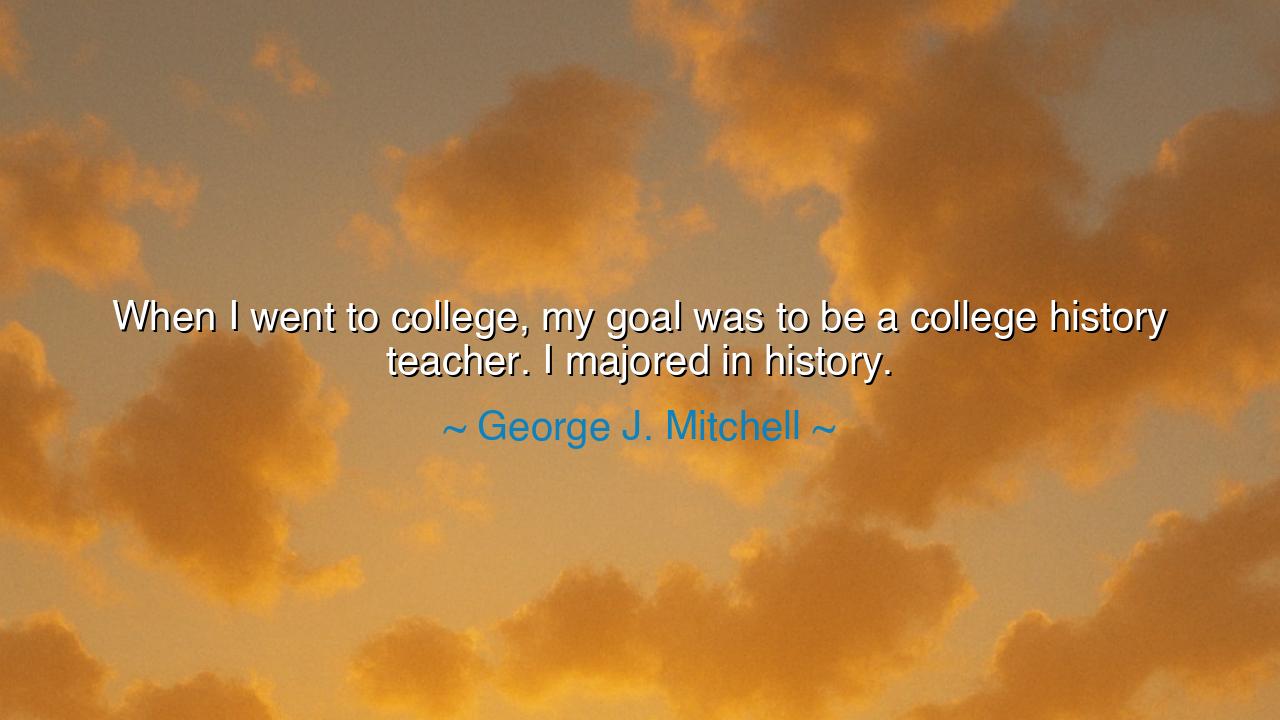
When I went to college, my goal was to be a college history
When I went to college, my goal was to be a college history teacher. I majored in history.






Hear, O seekers of wisdom, the words of George J. Mitchell, who once declared: “When I went to college, my goal was to be a college history teacher. I majored in history.” In this simple reflection there is more than the ambition of youth—there is the noble desire to preserve the memory of mankind, to shape future generations through the stories of the past. For the teacher of history is not merely a teller of dates and names, but a guardian of human experience, guiding the living by the victories and errors of those who came before.
Mitchell, who would one day become a senator, diplomat, and peacemaker, began not with dreams of power but with dreams of teaching. This origin is no accident. His later work—negotiating peace in Northern Ireland, laboring for justice in the Middle East, shaping policy in America—was rooted in the same spirit that leads one to the classroom: the belief that knowledge can heal, that truth can guide, that wisdom can prevent mankind from repeating its darkest chapters. His words remind us that the seeds of greatness are often sown in quiet goals, in the simple yearning to teach.
The study of history is a dialogue between the past and the present. Those who embrace it gain not only knowledge but perspective. For to know history is to see the folly of unchecked ambition, the power of courage, the weight of injustice, and the endurance of hope. A young George Mitchell, dreaming of being a history teacher, reveals the heart of one who wished to dedicate his life to understanding not only what happened, but why it mattered. And in that pursuit, he prepared himself for the great challenges he would face.
History offers countless examples of leaders shaped by their devotion to learning. Marcus Aurelius, emperor of Rome, was first a student of philosophy, trained to reflect on the rise and fall of men. His meditations, born from this education, guided him through war and turmoil. Similarly, Winston Churchill was a lifelong reader of history, and his knowledge of past wars gave him clarity to rally Britain in its darkest hour. So too with Mitchell: his grounding in history gave him the perspective to mediate between enemies, to remind them of the costs of war, and to show them the hope of peace.
The lesson shines clear: never despise humble beginnings. To aim to be a teacher is no lesser goal than to aim to be a ruler, for the teacher shapes minds, and from minds come the builders of nations. Mitchell’s journey teaches us that one’s early calling may transform, but it always leaves its mark. The desire to teach history may have shifted into the arena of politics, but the heart of a teacher—explaining, persuading, guiding—remained with him in every speech, in every negotiation, in every act of leadership.
Practical wisdom follows: study history, not as dry knowledge, but as a living guide. Let it teach you humility, for even empires crumble. Let it inspire you, for even the weakest can rise to greatness. And if you are a teacher, know the power of your work. The students before you may not remain in classrooms, but the lessons you plant will guide them in halls of justice, in fields of labor, in seats of power.
Thus, O children of tomorrow, carry Mitchell’s words in your hearts. The goal of teaching history is itself a seed of greatness. To know the past is to prepare for the future, and to teach it is to shape eternity. Whatever your chosen path, walk with the humility of a student and the courage of a teacher, and your life will echo like history itself—enduring, instructive, and alive.






AAdministratorAdministrator
Welcome, honored guests. Please leave a comment, we will respond soon